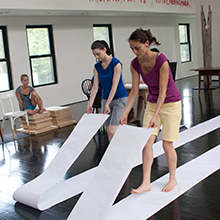
WWAWUT is a open source collective of artists and performers engaged in investigating the potential outcome and benefits born from a deeper relationship between our material objects and our selves.
Sasha Petrenko, founding member of WWAWUT (we will all wake up together) is a visual and performing artist from Northern California. Her installations and projects have been seen at Yerba Buena Center for the Arts, The LAB, CCA Wattis Institute of Contemporary Art and Southern Exposure in San Francisco. She has been awarded residencies at the Headlands Center for the Arts, the LAB, and Kala Art Institute in Berkeley, CA. She is an adjunct professor of Art at the University of San Francisco where she is also known as the “shop lady” in the Department of Art+Architecture.
Miriam Dym, artist and founder of dym products, focuses on humans’ interactions with the things they make (functional things and also fetish objects). She makes functional objects in series — including dishsponges, underwear, shorts, tables, and notes — then attempts to pass these objects off as art. Her work has been seen at the Brooklyn Museum of Art, SF MOMA, and the Weatherspoon, as well as in galleries in New York, Los Angeles, and Berlin. She has held residencies at, among others, the Cité des Arts, Paris, Stanford University, and Kala Art Institute, Berkeley.

WWAWUT (“We will all wake up together”) is a loose collective of visual and performing artists based in Oakland and Richmond, California. At Watermill, artists Sasha Petrenko and Miriam Dym will develop the movement and sound work associated with You and me-topia or Me and you-topia, a multidisciplinary project scheduled to debut in August 2011 in San Francisco.
“In a materialistic culture there is a gap between process and material. The relationship between the producer and the consumer is veiled. Material objects are fetishized as exchange-value is emphasized over use-value and the market fills the gap with new desires and identities, provided by the shiny new “things in our hands…” Process brings us closer to materials. Materials instructs us through process to engage with our physical world and, in turn, reconnect with ourselves as we are one and the same.” – WWAWUT, San Francisco, 2011
“….there is no inner man, man is in the world, and only in the world does he know himself.” – Maurice Merleau-Ponty, Phenomenology of perception, 1945.
“Our things in our hands must be equals, comrades… !” – Alexander Rodchenko, Paris, 1925.
